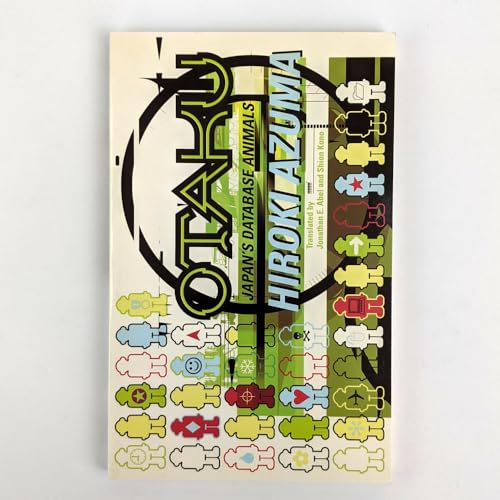Otaku
Japan's Database Animals
Hiroki Azuma
BOOK REVIEW

In the world of cultural criticism, few figures stand as boldly as Hiroki Azuma, whose seminal work, Otaku: Japan's Database Animals, serves as both a mirror and a magnifying glass to contemporary society's obsession with information. Azuma, a prominent figure in the realm of philosophy and cultural studies, brilliantly dissects the otaku phenomenon, illuminating how this subculture has transformed Japan's societal framework and its implications worldwide. This isn't merely an exploration of fandom; it's an exhilarating deep dive into the digital ethos that has recalibrated the way we consume culture. 🌐
At the heart of Azuma's argument is the notion that otaku culture, deeply embedded in the fabric of Japanese life, is not simply about a fondness for anime, manga, or video games. Instead, it symbolizes a kaleidoscope of contemporary identity that thrives on databases-items stripped of narrative, transformed into mere data points. This shift reflects a profound existential evolution within society, echoing the sentiments of our fast-paced, interconnected world. Here lies the crux: as we find ourselves inundated with a barrage of content competing for our fleeting attention, Azuma forces us to confront a startling question: What does it mean to lose ourselves in an ocean of information?
Delving deeper into his analysis, Azuma positions the otaku as the quintessential "database animal," navigating a landscape where cultural artifacts are reduced to mere components of consumption, devoid of richness. What does this say about our humanity? About our penchant for connection amidst bouts of isolation? It's a poignant observation that resonates with readers-even beyond the borders of Japan. He effectively charts how the otaku is both a product of, and a response to, the digital era's chaos.
⭐️ Feedback from readers reveals a complex tapestry of reactions. Some laud Azuma for his groundbreaking insights, citing how he deftly captures the essence of a generation grappling with the digital age's relentless march. Others criticize the perceived bleakness of his conclusions, arguing that he overlooks the communal aspects of otaku culture that foster genuine connections. These contrasting perspectives underscore the contentious nature of the very subject matter Azuma addresses-an indication that his work does not simply entertain but rather incites critical dialogue.
As you traverse the pages of Otaku: Japan's Database Animals, you encounter a blend of philosophical rigor and relatable narratives that open up discussions on identity, culture, and our relationship with media. Whether you find solace in the intricate world of otaku or recoil at the notion of humanity becoming mere data points, Azuma's work refuses to let you remain indifferent.
This is not just a book-it's an urgent call to reflect on our immersive experiences in a world saturated with content yet, paradoxically, often devoid of context. As we stand on the precipice of change, wrestling with our digital existences and yearning for authentic connections, Azuma's incisive commentary shines a light into the heart of our modern tumult. Are we ready to confront the implications of our choices? With Otaku, the question is not if you will engage-it's how deeply you'll plunge into the conversation it ignites. 🔍
In the wake of Azuma's revelations, perhaps there lies an uncharted path to understanding our own narratives amid the noise. Whether the otaku culture becomes a lifeline or an anchor in our digital seas remains to be seen. But one thing is certain: reading this book compels you to gaze into the digital abyss-and, crucially, confront what stares back.
📖 Otaku: Japan's Database Animals
✍ by Hiroki Azuma
🧾 200 pages
2009
#otaku #japans #database #animals #hiroki #azuma #HirokiAzuma